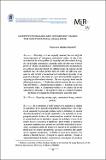|
Reseña:
|
Citizenship, as it was originally conceived, does not satisfy the current expectations of contemporary multicultural societies. In order to bet- ter understand the current problems of citizenship and ethno-cultural diversity, this article briefly contextualizes citizenship within the three main historical periods of Western constitutionalism. Notwithstanding that constitutionalism has addressed citizenship through two different models, the national and the republican ones, the article questions these old models and offers new argu- ments in order to build a transnational and multicultural citizenship. A core proposal of the paper is the creation of a new and more flexible conception of citizenship for ethno-cultural minorities. The new citizenship should meet the following characteristics: 1. Enable ethno-cultural minorities the access to basic rights and liberties; 2. Integrating cultural elements; 3. Including a set of basic socio-economic rights; 4. Incorporating residence as an essential rule for the acquisition of citizenship; 5. For migrants en route, it is essential to recognize the freedom of movement by granting temporary citizenship status.
Reseña: fundamental uncertainty over the implications of their policy choices and public displays of judicial weakness resulting from non-compliance. Yet, the very ambiguity that can hide non-compliance also removes a central source of pressure to comply that judges can place on policymakers that may disagree with a judicial decision but cannot afford the political backlash of publically ignoring an unambiguous order. In other words, ambiguity presents judges with a trade-off. We present a model of judicial opinions that suggests how courts evaluate this trade-off. A central conclusion is that vagueness is not clearly associated with a particular political environment. Courts in strong political positions may issue vague decisions to increase their influence over policy, while courts in weak positions may use vagueness to hide their lack of influence.
|



